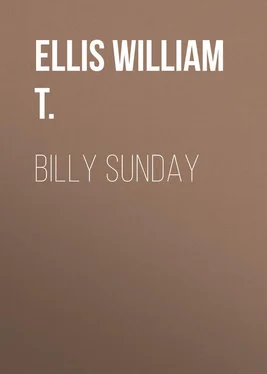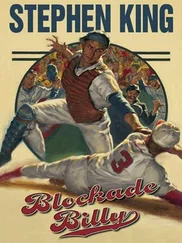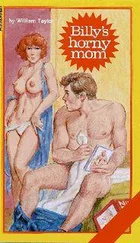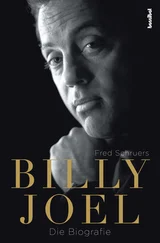William Ellis - Billy Sunday
Здесь есть возможность читать онлайн «William Ellis - Billy Sunday» — ознакомительный отрывок электронной книги совершенно бесплатно, а после прочтения отрывка купить полную версию. В некоторых случаях можно слушать аудио, скачать через торрент в формате fb2 и присутствует краткое содержание. Жанр: foreign_antique, foreign_prose, на английском языке. Описание произведения, (предисловие) а так же отзывы посетителей доступны на портале библиотеки ЛибКат.
- Название:Billy Sunday
- Автор:
- Жанр:
- Год:неизвестен
- ISBN:нет данных
- Рейтинг книги:3 / 5. Голосов: 1
-
Избранное:Добавить в избранное
- Отзывы:
-
Ваша оценка:
- 60
- 1
- 2
- 3
- 4
- 5
Billy Sunday: краткое содержание, описание и аннотация
Предлагаем к чтению аннотацию, описание, краткое содержание или предисловие (зависит от того, что написал сам автор книги «Billy Sunday»). Если вы не нашли необходимую информацию о книге — напишите в комментариях, мы постараемся отыскать её.
Billy Sunday — читать онлайн ознакомительный отрывок
Ниже представлен текст книги, разбитый по страницам. Система сохранения места последней прочитанной страницы, позволяет с удобством читать онлайн бесплатно книгу «Billy Sunday», без необходимости каждый раз заново искать на чём Вы остановились. Поставьте закладку, и сможете в любой момент перейти на страницу, на которой закончили чтение.
Интервал:
Закладка:
"But," says the whisky fellow, "we would lose trade; the farmer would not come to town to trade." You lie. I am a farmer. I was born and raised on a farm and I have the malodors of the barnyard on me today. Yes, sir. And when you say that you insult the best class of men on God's dirt. Say, when you put up the howl that if you don't have the saloons the farmer won't trade – say, Mr. Whisky Man, why do you dump money into politics and back the legislatures into the corner and fight to the last ditch to prevent the enactment of county local option? You know if the farmers were given a chance they would knock the whisky business into hell the first throw out of the box. You are afraid. You have cold feet on the proposition. You are afraid to give the farmer a chance. They are scared to death of you farmers.
I heard my friend ex-Governor Hanly, of Indiana, use the following illustrations:
"Oh, but," they say, "Governor, there is another danger to the local option, because it means a loss of market to the farmer. We are consumers of large quantities of grain in the manufacture of our products. If you drive us out of business you strike down that market and it will create a money panic in this country, such as you have never seen, if you do that." I might answer it by saying that less than two per cent of the grain produced in this country is used for that purpose, but I pass that by. I want to debate the merit of the statement itself, and I think I can demonstrate in ten minutes to any thoughtful man, to any farmer, that the brewer who furnishes him a market for a bushel of corn is not his benefactor, or the benefactor of any man, from an economic standpoint. Let us see. A farmer brings to the brewer a bushel of corn. He finds a market for it. He gets fifty cents and goes his way, with the statement of the brewer ringing in his ears, that the brewer is the benefactor. But you haven't got all the factors in the problem, Mr. Brewer, and you cannot get a correct solution of a problem without all the factors in the problem. You take the farmer's bushel of corn, brewer or distiller, and you brew and distill from it four and one-half gallons of spirits. I don't know how much he dilutes them before he puts them on the market. Only the brewer, the distiller and God know. The man who drinks it doesn't, but if he doesn't dilute it at all, he puts on the market four and a half gallons of intoxicating liquor, thirty-six pints. I am not going to trace the thirty-six pints. It will take too long. But I want to trace three of them and I will give you no imaginary stories plucked from the brain of an excited orator. I will take instances from the judicial pages of the Supreme Court and the Circuit Court judges' reports in Indiana and in Illinois to make my case.
Several years ago in the city of Chicago a young man of good parents, good character, one Sunday crossed the street and entered a saloon, open against the law. He found there boon companions. There were laughter, song and jest and much drinking. After awhile, drunk, insanely drunk, his money gone, he was kicked into the street. He found his way across to his mother's home. He importuned her for money to buy more drink. She refused him. He seized from the sideboard a revolver and ran out into the street and with the expressed determination of entering the saloon and getting more drink, money or no money. His fond mother followed him into the street. She put her hand upon him in a loving restraint. He struck it from him in anger, and then his sister came and added her entreaty in vain. And then a neighbor, whom he knew, trusted and respected, came and put his hand on him in gentleness and friendly kindness, but in an insanity of drunken rage he raised the revolver and shot his friend dead in his blood upon the street. There was a trial; he was found guilty of murder. He was sentenced to life imprisonment, and when the little mother heard the verdict – a frail little bit of a woman – she threw up her hands and fell in a swoon. In three hours she was dead.
In the streets of Freeport, Illinois, a young man of good family became involved in a controversy with a lewd woman of the town. He went in a drunken frenzy to his father's home, armed himself with a deadly weapon and set out for the city in search of the woman with whom he had quarreled. The first person he met upon the public square in the city, in the daylight, in a place where she had a right to be, was one of the most refined and cultured women of Freeport. She carried in her arms her babe – motherhood and babyhood, upon the streets of Freeport in the day time, where they had a right to be – but this young man in his drunken insanity mistook her for the woman he sought and shot her dead upon the streets with her babe in her arms. He was tried and Judge Ferand, in sentencing him to life imprisonment said: "You are the seventh man in two years to be sentenced for murder while intoxicated."
In the city of Anderson, you remember the tragedy in the Blake home. A young man came home intoxicated, demanding money of his mother. She refused it. He seized from the wood box a hatchet and killed his mother and then robbed her. You remember he fled. The officer of the law pursued him and brought him back. An indictment was read to him charging him with the murder of the mother who had given him his birth, of her who had gone down into the valley of the shadow of death to give him life, of her who had looked down into his blue eyes and thanked God for his life. And he said, "I am guilty; I did it all." And Judge McClure sentenced him to life imprisonment.
Now I have followed probably three of the thirty-six pints of the farmer's product of a bushel of corn and the three of them have struck down seven lives, the three boys who committed the murders, the three persons who were killed and the little mother who died of a broken heart. And now, I want to know, my farmer friend, if this has been a good commercial transaction for you? You sold a bushel of corn; you found a market; you got fifty cents; but a fraction of this product struck down seven lives, all of whom would have been consumers of your products for their life expectancy. And do you mean to say that is a good economic transaction to you? That disposes of the market question until it is answered; let no man argue further.
And say, my friends, New York City's annual drink bill is $365,000,000 a year, $1,000,000 a day. Listen a minute. That is four times the annual output of gold, and six times the value of all the silver mined in the United States. And in New York there is one saloon for every thirty families. The money spent in New York by the working people for drink in ten years would buy every working man in New York a beautiful home, allowing $3,500 for house and lot. It would take fifty persons one year to count the money in $1 bills, and they would cover 10,000 acres of ground. That is what the people in New York dump into the whisky hole in one year. And then you wonder why there is poverty and crime, and that the country is not more prosperous.
The whisky gang is circulating a circular about Kansas City, Kansas. I defy you to prove a statement in it. Kansas City is a town of 100,000 population, and temperance went into effect July 1, 1905. Then they had 250 saloons, 200 gambling hells and 60 houses of ill fame. The population was largely foreign, and inquiries have come from Germany, Sweden and Norway, asking the influence of the enforcement of the prohibitory law.
At the end of one year the president of one of the largest banks in that city, a man who protested against the enforcement of the prohibitory law on the ground that it would hurt business, found that his bank deposits had increased $1,700,000, and seventy-two per cent of the deposits were from men who had never saved a cent before, and forty-two per cent came from men who never had a dollar in the bank, but because the saloons were driven out they had a chance to save, and the people who objected on the grounds that it would injure business found an increase of 209 per cent in building operations; and, furthermore, there were three times as many more people seeking investment, and court expenses decreased $25,000 in one year.
Читать дальшеИнтервал:
Закладка:
Похожие книги на «Billy Sunday»
Представляем Вашему вниманию похожие книги на «Billy Sunday» списком для выбора. Мы отобрали схожую по названию и смыслу литературу в надежде предоставить читателям больше вариантов отыскать новые, интересные, ещё непрочитанные произведения.
Обсуждение, отзывы о книге «Billy Sunday» и просто собственные мнения читателей. Оставьте ваши комментарии, напишите, что Вы думаете о произведении, его смысле или главных героях. Укажите что конкретно понравилось, а что нет, и почему Вы так считаете.












